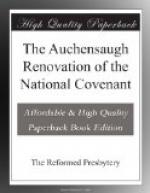While these steps of apostasy were in progress, the Lord preserved a “wasted remnant” of witnesses, who “resisted unto blood striving against sin.” These valiant Christian patriots—“the Society People”—kept themselves and their garments clean, and kept also the word of Christ’s patience. They never were dissenters, nor properly called the “Old Dissenters.” During this hour of temptation they were destitute of the help and guidance of a public ministry. At length, in the year 1706, Mr. John M’Millan, wearing the honorable badges of suspension and deposition, imposed by his apostate brethren for advocating in their Assembly the continued obligation of the Covenants. National and Solemn League, (Is. lxvi: 5,) was joyfully received as their minister by the voice of the Society people. In the year 1712, at Auchensaugh, Mr. M’Millan, with the assistance of Mr. John M’Neil, licentiate, “resolved to set about this solemn and tremendous duty of renewing their national covenants with God.” Their mode of procedure was Scriptural, following the examples of Moses and others to Nehemiah—“the footsteps of the flock.” They framed three papers, History, Confession and Engagement. The text of the Covenants of our fathers was left entire, only some explanatory words and phrases being placed in the margin. These explanations were then necessary to clear that question of questions—“Shall the throne of iniquity have fellowship with thee?”—a question to be finally settled only at the sounding of the last Apocalyptic trumpet. Rev. xi: 15. That transaction was ever after incorporated with the Terms of Communion.
Some years after this transaction another renovation took place in Scotland, at a locality called Crawford-John; but no attainments were then made, nor has any authentic record of the proceedings been transmitted to posterity. Also the Seceders, soon after their erection as a distinct organization in Scotland, and repeatedly since in Britain and America, by public covenanting have contributed to the preservation of sound doctrine and Christian practice. We cannot, however, accord to them the honor of being the successors of the covenanted witnesses, which they unwarrantably claim, seeing that they disowned the “civil part” of the public Covenants, and thus unwittingly, we charitably believe, passed an implied censure on the One Lawgiver for having given us a second table in the moral law!
We merely refer to the Octoraro transaction, (1743,) conducted by that unstable minister, Mr. Craighead, as being unworthy of anything more than historical notice.




